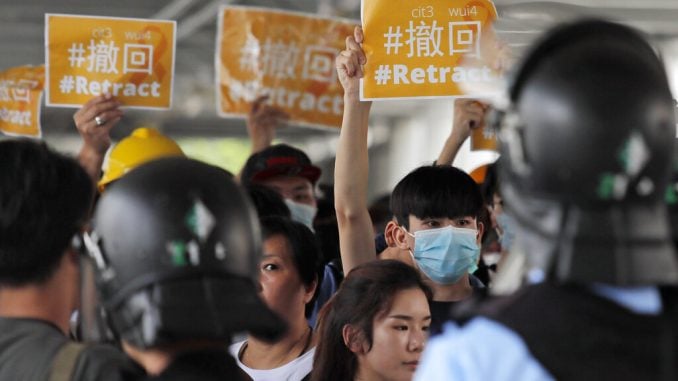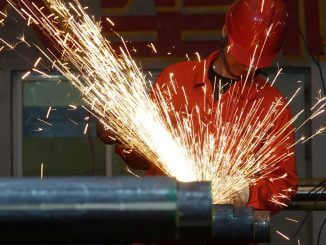
HONG KONG — China’s government strongly backed Hong Kong’s embattled administration Tuesday, saying pro-democracy protesters who occupied and vandalized the city’s legislature committed “serious illegal acts” that endangered the social order.
Chinese state media broadcast video of police in Hong Kong clearing protesters from the streets earlier in the day in a break with their silence over days of demonstrations that have challenged Beijing’s authority over the semi-autonomous territory.
Foreign Ministry spokesman Geng Shuang said Beijing condemned the acts that saw several hundred demonstrators smash through glass and steel barriers to enter the building on Monday night, defacing portraits of lawmakers and spray-painting pro-democracy slogans in the chamber.
China’s central government voiced support for Hong Kong’s Chief Executive Carrie Lam and the city’s police force in dealing with the incident in accordance with law, Geng said.
He also reiterated China’s rejection of any foreign nation commenting on or intervening in protest actions in Hong Kong, saying such matters were a purely Chinese affair and other countries “must not support any violent criminals in any form, and not send any misleading signals or take any erroneous actions.”
His comments follow the publication of an editorial by a ruling Chinese Communist Party newspaper that said the demonstrators who broke into the local legislature showed their “arrogance” and had no regard for the rule of law.
Speaking in Hong Kong, U.S. Consul General Kurt Tong criticized violence among government critics but said all should have the right to express their views peacefully, including foreign residents with longstanding ties to the Asian financial hub.
Hong Kong has been through a “tough time” over recent months, but the intentions of those seeking to effect change were good and the territory has “the right ideas and the right values,” Tong said.
The U.S. feels like “we have a legitimate voice to express our concerns about issues of politics or governance or economic policy or the like,” he said. “And so, we certainly don’t view that as an interference. Nobody has to listen to our comments if they don’t want to, but we feel like we’re within bounds by expressing ourselves.”
Beijing has largely sought to play down the demonstrations that have highlighted doubts about the validity of its “one country, two systems” formula for governing the former British colony. Its coverage of the protests and the publication of a harsh editorial in the official Communist Party newspaper Global Times may indicate it is prepared to take a tougher line against the demonstrators.
Veteran opposition figure Joshua Wong acknowledged that the damage to the legislative offices has drawn criticism from some sectors in Hong Kong. But he said huge marches and rallies in previous weeks showed there was a groundswell of support for the demonstrators’ goals of demanding more accountability from Lam’s administration.
“I understand people in Hong Kong and around the world might not 100% agree or disagree on all of the behavior of protesters … but all of the requests have been ignored. So is there any way out?” Wong said.
Lam is “not capable as leader anymore” and should resign, Wong said, echoing the demand of many protesters. Having been elected by a Beijing-approved committee, Lam is reliant on continuing support from Beijing, which has shown no outward signs of abandoning her.
Wong also alleged that police officers had “double standards” in enforcing the law, saying pro-Beijing lawmakers and their staff have gotten better treatment than their opposition counterparts in the weeks of protest outside the legislature.
On the mainland, Beijing had sought to suppress news of the protests, which roughly coincided with celebrations of the 22nd anniversary of Hong Kong’s handover from British to Chinese rule.
The demonstrations reflect mounting frustration with Lam and her government for not responding to demands from opposition figures that were originally sparked by a government attempt to change extradition laws to allow suspects to be sent to China for trial. Lam has shelved the bills but not agreed to scrap them altogether as opponents insist.



